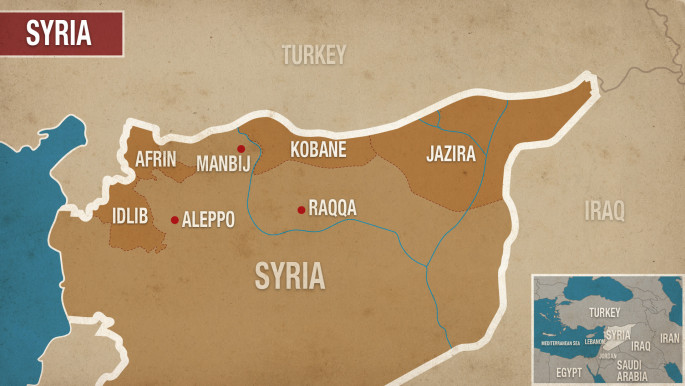Turkey is in Syria and Iraq to stay
It's also the latest indication of how willing Turkey is to send ground forces across its international frontiers to confront the group and occupy territory, perhaps indefinitely, to secure the gains it has made against the group.
During the 1990s, Turkey conducted two major large-scale ground incursions into Iraqi Kurdistan against the outlawed group, using approximately 30,000 troops each time. Those operations, however, failed to decisively uproot the group, especially from its mountainous stronghold of Qandil.
The mere threat of Turkish invasion in October 1998, done through the massing of armour and 10,000 troops along the border, prompted Syria to send the PKK's leader Abdullah Ocalan, whom Damascus had hosted, into exile - where he was captured, in Kenya, the following year.
Since the war between these two rivals rignited three years ago, following the collapse of an historic ceasefire implemented in early 2013, the fighting has been more ferocious.
In late 2015 the PKK ditched its standard guerrilla warfare tactics, which it usually exercised in rural areas, by entering the cities and engaging the Turkish military in highly destructive urban warfare.
This had disastrous results - Turkey's scorched earth campaign against the guerrillas reduced Kurdish cities in southeast Turkey to rubble. The region's capital, Diyarbakir, was badly damaged and in the town of Sirnak not a single building remained standing.
It's unclear why exactly the PKK used such a tactic. The speculated rationale range from a bid to show the heavy-handed nature of the Turkish state, to an attempt to bog down the Turkish military in southeast Turkey, to delaying a Turkish invasion of territories held by Syrian Kurds just south of the border.
 |
The operation did fulfill Turkey's strategic goal of blocking the YPG from linking up its north-eastern territories Syria with its isolated landlocked territory of Afrin further northwest |  |
Whatever the case Turkey ultimately prevailed in early 2016. Later, on August 24, 2016, it launched its first cross-border incursion into northwest Syria, Operation Euphrates Shield.
While primarily directed against Islamic State group and not the PKK's Syrian Kurdish offshoot, the People's Protection Units (YPG), the operation did fulfill Turkey's strategic goal of blocking the YPG from linking up its north-eastern territories Syria with its isolated landlocked territory of Afrin further northwest.
 |
| The Syrian YPG Kurdish armed group had held Afrin, Jazira and Kobane before Turkey's incursion into Syria's north-west |
Euphrates Shield ultimately took seven months, prolonged by the drawn-out battle against IS in the city of Al-Bab, approximately 30km south of the Turkish border. Ankara vowed not to return the territories it captured to Damascus and has since trained several Syrian police units there, touting the area as a safe haven for war-weary Syrians, and even creating an industrial zone in Al-Bab to employ Syrians in manufacturing jobs.
The next major Turkish operation in Syria solely targeted the YPG. In January, Turkey launched its invasion of Afrin, bizarrely calling it "Operation Olive Branch". While the Turkish press claimed it was fighting IS there, this remains unlikely. Having fought the PKK insurgency in Turkey
for nearly 35 years with a death toll in the tens of thousands, Ankara had serious concerns about the PKK-allied YPG holding territory just across its border.
The incursion took two months, with the YPG fighting strenuously to defend its positions in rural areas, but opting not to engage in urban warfare in Afrin city - likely saving the city from the kind of outright destruction afflicted on Sirnak and Al-Bab.
As with Euphrates Shield, Turkey has stressed it will not cede Afrin back to Damascus and will likely occupy the region for years to come. This fact demonstrates Turkey's long-term plan to make its battlefield gains against the PKK and YPG permanent, securing strategic victories against the groups rather than potentially short-lived tactical advantages.
This brings us to the current operation in Iraqi Kurdistan. Launched in March, Turkey has penetrated at least 27km into Iraqi Kurdistan, clearing the PKK from villages it has controlled since the 1990s and establishing 11 bases.
 |
It's unclear how long Turkey can retain its positions in both countries or how far it will extend from its current positions |  |
Turkish leaders have reiterated their threat to force the PKK from its Qandil mountain stronghold. Regardless of when, or whether, they do this, Ankara's offensive to date is following a similar pattern as its Syrian operations - limiting the PKK's movement by establishing what will likely amount to permanent positions from which it can more swiftly act.
Ankara has justified the incursion as a direct effort to secure Turkey's Kurdish-majority southeast from the group and a way of consolidating its offensives in the area.
It's unclear how long Turkey can retain its positions in both countries or how far it will extend from its current positions. Its occupation of Afrin depends heavily on securing 12 positions in neighbouring Idlib province, established under the framework of the Astana Agreement with Iran and Russia to deescalate that area.
Whatever ultimately happens in Idlib will likely affect Ankara's position in Afrin. Similarly, Turkey cannot risk invading the Kurdish-held territories across all of northeast Syria, given the American military presence there. Instead it is negotiating with the US for the withdrawal of the YPG from the northwestern Arab city of Manbij.
Also, in Iraqi Kurdistan, the further it extends its current operation the riskier and more dangerous it will likely become and the greater likelihood that opposition from regional powers will mount.
In the meantime, Turkey has made substantial headway against its Kurdish adversaries through its continuous offensive cross-border campaigns against them and remains in a position to secure its gains for the foreseeable future.
Follow him on Twitter: @pauliddon



